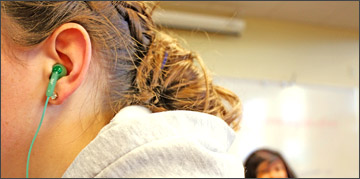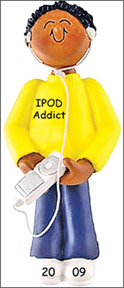|
VARIETY
Unplug the music
Protect your ears...
Listening to music via MP3 players while travelling in buses and
trains have become the latest trend among the younger generation today.
 Not
only MP3 Players, but also ipods and mobile phones are used to listen to
music to overcome the boredom while travelling. Sometimes, thisis done
when they do not like the music played in the bus, or simply because
trendy children do it. Not
only MP3 Players, but also ipods and mobile phones are used to listen to
music to overcome the boredom while travelling. Sometimes, thisis done
when they do not like the music played in the bus, or simply because
trendy children do it.
 Whatever
the reason may be, a majority of youth in this modern generation are
addicted to this . Even while walking on the road many youngsters plug
in the handsets of music players into their ears. If they are in a noisy
place, they naturally increase the volume to the maximum to get a better
reception by drowning the noise in the surroundings. But, is this habit
safe? Whatever
the reason may be, a majority of youth in this modern generation are
addicted to this . Even while walking on the road many youngsters plug
in the handsets of music players into their ears. If they are in a noisy
place, they naturally increase the volume to the maximum to get a better
reception by drowning the noise in the surroundings. But, is this habit
safe?
According to a recent research conducted by the Industrial Technology
Institute (ITI), this habit among the Sri Lankan youth can lead to a
hearing-impaired future generation. Senior Deputy Director of ITI,
Ananda Pannila said that listening to high-pitched music for most of the
day, and in close proximity to the eardrums, could lead to loss of
hearing.
"Most children, when they are in noisy places, increase the volume of
the MP3 player to the maximum. This produces a sound of around 85 - 100
decibels inside the ear. This is equal to a noise created by a loud live
band at a wedding reception, he explained.
The research team had developed an artificial ear with a microphone
in place of the eardrum to test the effects of different frequencies of
noise from different types of players.
Then by using several phone models that are available in the local
market they had measured the impact of the decibel levels on the
eardrum.
After experimenting with varying levels and models they had finally
found that when the volume is increased to 90 per cent of the maximum
possible volume , the player produces a sound of around 90 decibels, but
when the volume is increased to 50 per cent of the maximum possible
volume it generates a sound of around 70 decibels or less.
According to the general rule, a sound of 85 decibels or below is
considered as safe to the human ear. "We found out that most of the
phones and MP3 players, which are available at very low prices, are not
up to the standard and can cause more damage to our ear," said Pannila.
"If a person is listening to music through the head phones by
increasing the volume to the maximum, he should not continue that for
more than 10 minutes," he warned.
"The recommended level to listen to music is by keeping the volum
level to 50 per cent and that too only for a maximum of three hours at a
stretch,"he said.Hearing impairments does not occur within a day or two,
like catching a common cold.
It takes years to develop a hearing problem. Once the damage is done,
it is not reversible. Then the only remedy will be to wear hearing aids.
If that happens, life is not going to be easy at all.
"This is not a problem unique to Sri Lanka," he added.Health
officials in the USA and in many European countries too face this
problem. As a safety measure, now many players have software to warn the
user of the health risk, if they exceed the safety limit," he said.
Janani Amarasekera
************
What is a decibel?
A decibel is one unit on the decibel scale. The name means one-tenth
of a bel, a bel is a unit named after Alexander Graham Bell and used to
compare intensity of sound. The abbreviation of bel is B and decibel,
dB.
10 dB = 1 B
The primary use of the decibel scale today is to test audibility, and
the results are called the sound-pressure level (SPL), which is similar
to loudness. The Occupational Safety and Health Association (OSHA) have
set guidelines to help people determine the maximum loudness they should
be exposed to. The SPL level that OSHA recommends is 85 decibels, above
which special ear protection is required. Eighty-five decibels is the
threshold for the possibility of noise-related hearing loss, and this
guideline is intended to prevent such hearing loss.
************ |

